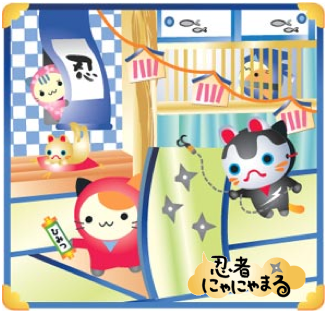
Ninja Nyanyamaru
Japanese Name: 忍者にゃにゃまる Literal Translation: Valuable Meow Meow Ninja Released: January 2002 Original Japanese: WWW Ninja Nyanyanmaru is right now visiting! The villains target the national treasure of the country of Cat Powdera, and one cat ninja rises up to fight them. It is interesting to become acquainted with the fun and cute group and the Nyanyamaru world embraces life and appears! You can fully enjoy with your friends! 忍者にゃにゃまるただいま参上!マタタビ国の国宝をねらう悪党と戦うべく、一匹のネコ忍者が立ち上がった。 楽しくかわいい仲間たちと、知れば知るほどおもしろい、にゃにゃまるワールドがにぎにぎしくおめみえ!お友達とあそべるアイテムもいっぱいだよ。 Characters
Images 



|
These ninja cats seem to have a mushroom theme going on! Each one is named for a mushroom!
Shown in the picture on the left, the ninja Nyanyamaru is defending the Gold Nyachihoko, a pun on shachihoko (see below). Japanese Culture 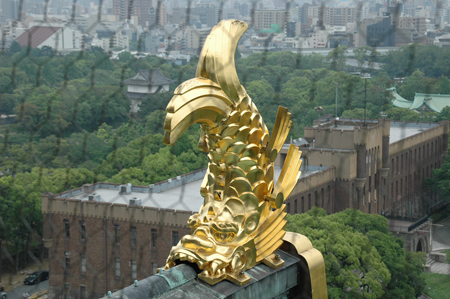 1. Shachihoko (しゃちほこ) is an animal in Japanese folklore with the head of a tiger and the body of a carp. It was believed that this animal could cause the rain to fall, and as such, temples and castles were often adorned with roof ornaments (shibi) crafted in the form of a shachihoko, in order to protect them from fire. The statues can be made of gold. Here it is a pun with "nya" at the beginning of the word! Wikipedia: Shachihoko 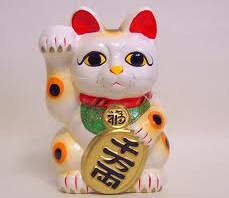 2. Maneki-neko (招き猫, literally "Beckoning Cat"; also known as Welcoming Cat, Lucky Cat, Money Cat, or Fortune Cat) is a common Japanese figurine (lucky charm, talisman), usually made of ceramic, which is believed to bring good luck to the owner. The figurine depicts a cat (traditionally a calico Japanese Bobtail) beckoning with an upright paw, and is usually displayed—many times at the entrance—in shops, restaurants, pachinko parlors, and other businesses. Some of the sculptures are electric or battery-powered and have a slow-moving paw beckoning. Wikiepdia: Maneki-neko Translation Notes a. "Matatabi" (マタタビ) is actinidia polygama (also known as Silver Vine and Cat Powder) which is a non-toxic plant in the Actinidiaceae family. It grows in the mountainous areas of Japan at elevations between 500–1900 meters. Wikipedia: Cat Powder b. "Maru" means "valuable" and was formerly a popular suffix for samurai boys' childhood names. "Maru" was used in the days of the samurai (Sengoku and Edo periods) to names of young boys before they reach adulthood. Children of high-ranking saumurai (such as feudal lords) were given different names for different stages of their lives (infancy, childhood, adolescence and adulthood). c. Nekojarashi (猫じゃらし) is a pun and means literally to tease or play with cats. It is also a type of plant which we call foxtail in English, but is called nekojarashi meaning "cat tease" in Japanese. Wikipedia: Nekojarashi 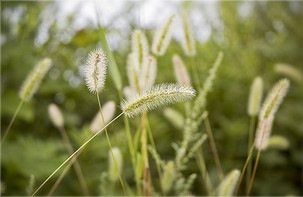 d. In Asian grocery stores, the mushroom is known by its Japanese name maitake (舞茸), which means "dancing mushroom". The fungus is native to the northeastern part of Japan, and is prized in traditional Japanese herbology as a medicinal mushroom, an aid to balance out altered body systems to a normal level. Due to the taste and texture of the mushroom, it is widely eaten in Japan, although the mushroom has been alleged to cause allergic reactions in rare cases. Wikipedia: Dancing Mushroom e. Kikurage is sold dry in most Asian stores. It expands a lot when soaked in water. It has a faint earthy flavour and gently crunchy, agaric texture for which it is mostly prized. It is popular in Japanese cuisine. Wikipedia: Kikurage f. Matsutake (松茸, pine mushroom) is a highly sought after mycorrhizal mushroom that grows in Asia, Europe, and North America. It is prized by the Japanese for its distinct spicy-aromatic odor. Wikipedia: Matsutake g. Nameko (ナメコ), is a small, amber-brown mushroom with a slightly gelatinous coating that is used as an ingredient in miso soup and nabemono. It is one of Japan's most popular cultivated mushrooms, tasting slightly nutty and is often used in stir-fries. Wikipedia: Nameko h. Shinachiku (シナチク or 支那竹)meaning "Chinese bamboo" is also called menma (メンマ or 麺麻 or 麺碼) and is a Japanese condiment made from lactate-fermented bamboo shoots. The bamboo shots are dried in the sun or through other means before the fermentation process. Menma is a common topping for noodle soups, notably ramen. Wikipedia: Shinachiku i. Han most likely refers to the popular Han name in China. The Han Dynasty (汉朝) (206 BCE – 220 CE) was an imperial dynasty of China. To this day, China's majority ethnic group refers to itself as the "Han people" and Chinese characters are referred to as "Han characters". Wikipedia: Han Dynasty j. Karakuri ningyou (からくり人形) are mechanized puppets or automata from Japan from the 17th century to 19th century. The word karakuri means "mechanisms" or "trick". Wikipedia: Karakuri ningyou |
Updates
May 4, 2012 - Thank you to everyone who has been visiting. I plan to update weekly now so be sure to check back every Monday for a new crazy cute character! Requests are very welcome and so far Mamegoma, Rilakkuma, and Nyan Nyan Nyanko have been requested and are in the process.... please be patient as there is a lot of information about them! Please keep spreading the word about the cuteness of San-X!!!
Monday, October 15, 2012
Ninja Nyanyamaru
Subscribe to:
Post Comments (Atom)

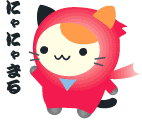
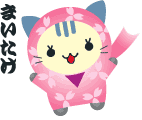
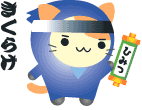
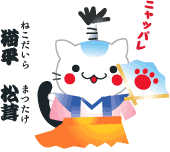
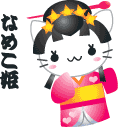
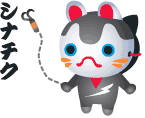
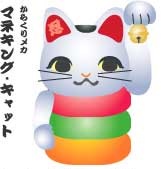
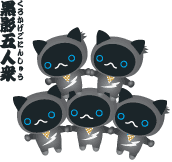
No comments:
Post a Comment